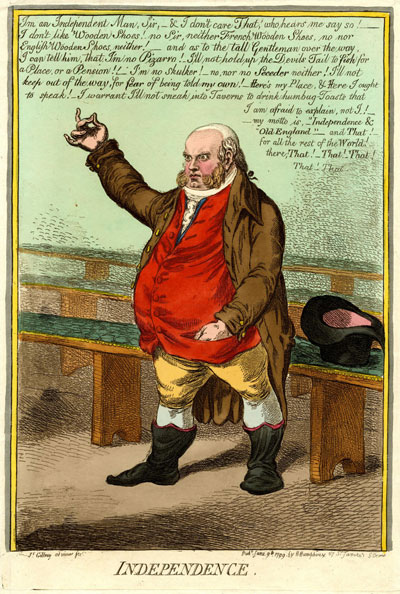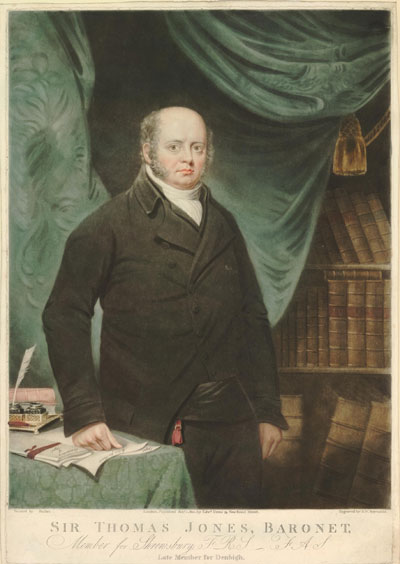Independence
This memorable portrait of the proudly independent Thomas Tyrwhitt Jones is just one example of the many variations Gillray played upon the basic design of portrait caricature in his later career. And it is a print that only Gillray could have produced.

© Trustees of the British Museum
Like most portrait caricatures it shows a single full-length figure and again like the traditional portrait caricature the title provides a clue to his identity without specifically naming him. But unlike the flat, profile line drawings of early caricature, and even early Gillray, this 3/4 portrait is anything but flat, using the full range of etching skills Gillray had developed by the 90's to create an exaggerated, but thoroughly convincing portrait of Jones speaking as a Member of Parliament. But with a sly satiric jab at the cost of independence, Gillray creates, in this instance, a background of parliamentary benches significantly empty of supporters for his speech.

Sir Thomas Jones, Baronet
[January 1, 1801]
© Trustees of the British Museum
As the brief biography in the online History of Parliament notes, Tyrwhitt Jones started his political life as a member of the Whig club, but by 1797 as the Member of Parliament from Denbigh Boroughs, he took his own quirky line, neither Whig nor Tory, opposing Fox's peace plans but also Pitt's land tax redemption bill. Outspoken, blunt, and with a fondness for the hyperbolic (if inaccurate) statement, he was regarded by most of his colleagues as more of an amusement than a serious thinker and speaker.
Gillray brings out the larger than life character of Jone's presence by exaggerating his weight and by brilliantly parodying Jones's rhetorical manner in the extended text of the "speech" appearing above his head. Gillray's training as an engraver of business cards and invitations enables him (uniquely among caricaturists of his time) to produce an attractive and flawless acript.
I'm an Independent Man, Sir, - & don't care That! who hears me say so! - I dont like Wooden Shoes! no Sir, neither French Wooden Shoes, no nor English Wooden shoes, neither! - and as to the tall Gentleman over the way, I can tell him, that I'm no Pizarro! - I'll not hold up the Devil's Tail to fish for a Place, or a Pension!! - I'm no skulker! - no, nor no Seceder neither! I'll not keep out of the way, for fear of being told my own! - Here's my Place, & Here I ought to speak! - I warrant I'll not sneak into Taverns to drink humbug-Toasts that I am afraid to explain, not I! - my motto is, "Independence & Old England" - and That! for all the rest of the World! there; That! - That! - That! - That! - That!
As part of defining his independence. Jones mentions several things he is NOT. He is no Pizarro, no skulker or seceder, no author of humbug toasts. And given that insistence on his own idependence, one would expect to find more or less equal critiques of both Whig and Tory positions in his speech. But, in fact, the words that Gillray puts in Jones's mouth are almost exclusively attacks on the Whigs.
The reference to Pizarro recalls Gillray's identification of the villain Pizarro, plunderer of Peru, with Richard Brinsley Sheridan in Gilllray's Pizarro Contemplating Over the Product of his New Peruvian Mine which had been published just three days before this print. And it is consistent with Gillray's portrayal of Sheridan elsewhere as a Judas figure willing to sell out anyone or anything for profit or promotion.
The reference to a skulker and seceder is clearly aimed at Charles James Fox, leader of the Whigs in the House of Commons, as he is portrayed by Gillray in Stealing off, or Prudent Secession running away in embarrassment from his Parliamentary responsibilities to his wife's house at St. Ann's Hill.
And the reference to "humbug toasts" is just as obviously directed at the Duke of Norfolk who, at a birthday celebration for Fox on January 24, 1798, had proposed a provocative toast, which seemed to suggest that the Sovereign was not the King but the Majesty of the People. Norfolk's presumption that the toast was worded ambiguously enough to provide him with plausible deniability proved to be insufficient for the King as Gillray indicated in The Loyal Toast published in February 1798.
Sources and Reading
- Commentary from the British Museum on Independence.
- "Thomas Tyrwhitt Jones," Wikipedia
- "JONES, Thomas," History of Parliament
- "Richard Brinsley Sheridan," Wikipedia
- "Charles James Fox," Wikipedia
- "Charles Howard, 11th Duke of Norfolk," Wikipedia
- Thomas Wright and R.H. Evans, Historical and Descriptive Account of the Caricatures of James Gillray #243.
- Thomas Wright and Joseph Grego, The Works of James Gillray, the Caricaturist; With the History of His Life and Times, p. 264.
Comments & Corrections
NOTE: Comments and/or corrections are always appreciated. To make that easier, I have included a form below that you can use. I promise never to share any of the info provided without your express permission.